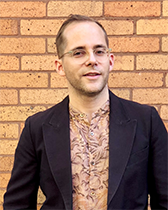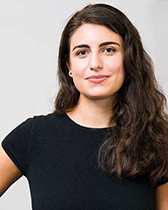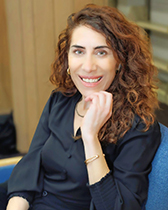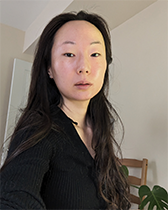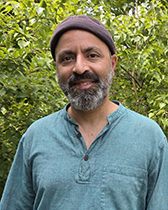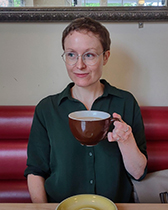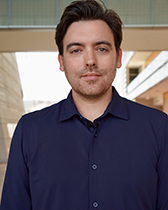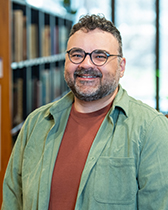Fellows 2025-2026
Kaplan Institute Fellowships offer faculty course reductions so that they can develop research projects within an interdisciplinary community. Kaplan Fellows, who are selected by an external team of reviewers, present work in progress at weekly lunchtime colloquia and participate in Institute events and committees.
Nathalie Bouzaglo
Associate Professor, Department of Spanish and Portuguese
Project: The Corset: A Critical Anatomy from Latin America Fin-de-Siècle
"This project examines the persistent use of the corset in Latin America at the end of the 19th century and its power to shape a refined, sexualized, and pain-marked body. By retelling the journey of the corset's uses and abuses, I propose that the garment defined high and low culture, good and bad taste, illness, and health. Ultimately, I connect it to material and symbolic strategies for expropriating the female body."
Corey Byrnes
Associate Professor, Department of Asian Languages and Cultures, Kaplan Institute for the Humanities, and Program in Comparative Literary Studies
Project: Cultures of Threat
"My project is about what I call 'cultures of threat' and how they produce unfolding environmental and social futures. Cultures of threat encompass forms of representation and practices through which an imagined, feared future comes to seem both real and imminent. I theorize the mechanisms of threat culture by reconsidering the relationship between 'China,' understood as both place and idea, and the United States, an exemplar of a Sinophobic global imaginary that perceives a 'rising China' as an environmental and geopolitical threat."
Miguel Caballero
Assistant Professor, Department of Spanish and Portuguese
Project: Adherence and Addiction. HIV in the Times of Chronification
"How do HIV-positive people engage with the healthcare industry, pharmaceutical corporations, and legal frameworks shaping their lives? This is the central question of my book project, Adherence and Addiction: HIV in the Times of Chronification. Drawing on my experience as an HIV-positive activist (ASS—Amor, Sexo y Serología), I examine how contemporary HIV-positive artists and activists raise important questions about care and harm within medical, corporate, and legal systems."
Alicia Caticha
Assistant Professor, Department of Art History
Project: Sculpting Whiteness in Eighteenth-Century France: Sugar, Porcelain, Marble
"Sculpting Whiteness traces an intermedial history of French sculpture made in sugar, porcelain, and marble (circa 1740-1780) to understand how 'white sculpture' became ontologically linked with a racialized epidermis over the course of the eighteenth century. Rather than understanding sugar and porcelain—both products of global and colonial trade—as derivative of marble, I posit that it was the artificial construction of whiteness across materials that reified associations between marble, whiteness, and skin color."
Maayan Hilel
Assistant Professor of Instruction and Assistant Director of the Crown Family Center for Jewish and Israel Studies
Project: Leisure and Pleasure in Mandate Palestine: Everyday Life and the Politics of Culture
Leisure and Pleasure in Mandate Palestine examines how the rise of modern leisure culture—cafés, cinemas, beaches, cabarets, and sports clubs—shaped socio-cultural transformation, collective identities, and intercommunal relations in urban Palestine under British rule. Drawing on multilingual and underutilized sources, the book highlights leisure as a key arena of cultural production, everyday recreational practices, and political expression by ordinary people. It situates Palestinian society within regional and transnational cultural networks, offering new insights into modernity and mass culture in the Middle East.
Marianne Hopman
Associate Professor, Department of Classics and Program in Comparative Literary Studies
Project: Unbinding Prometheus: Theater and Theology in Fifth-Century BCE Athens
"My project is the first book-long attempt to illuminate the cultural work performed by the influential Greek tragedy, Prometheus Bound, within the rapidly changing religious, political, and intellectual landscape of fifth-century BCE Athens. Through detailed analyses of the sensorial, emotional, and cognitive experience created by the performance, I show how PB negotiated for its audience the complex position of the technician god, Prometheus, within Athenian polytheism."
Benn Joseph
Head of Collections Services, McCormick Library of Special Collections and University Archives
Library Fellow 2025-2026
Project: The Business of Isolationism: Robert R. McCormick’s Tribune Experimental Farm, 1928-1953
This research project will study the political leanings and historical significance of Chicago Tribune publisher Robert R. McCormick’s Tribune Experimental Farm, which he developed in Yorkville, Illinois beginning in the late 1920s. Though framed as an agricultural venture to generate content for the Tribune, the farm reflected McCormick’s isolationist views and America First ideals, and was envisioned by McCormick as a self-sufficient retreat against potential political and social upheaval.
Dahye Kim
Assistant Professor, Department of Asian Languages and Cultures
Project: Techno-Fiction: Science Fiction and the Reinvention of Writing in South Korea’s Informatization Era
"My book examines how the information revolution of the 1980s and 1990s transformed literature and writing culture in South Korea. It focuses especially on what German media theorists call the technik of writing—a concept that encompasses both technological mediation and the human technique of writing—in a country where the national writing system posed various techno-cultural challenges in the face of digitization. Focusing on what I define as techno-fiction, a term that includes science fiction, technocratic documents, and digitally mediated literature, I argue that this recent history—when the materiality of writing and culture became a shared concern among writers, critics, scholars, and even programmers—reveals the fundamentally entangled nature of technology and culture."
Rajeev Kinra
Associate Professor, Department of History and Programs in Comparative Literary Studies and Middle East and North African Studies
Project: Towards a More Global History of Religious Toleration: The View from Mughal India
"In my current book, I aim to draw attention to some of the largely forgotten ways in which approaches to religious toleration and cultural pluralism in the Mughal Empire (~16th-18th cents.) informed debates about these subjects in contemporaneous Europe, especially England and France. I ask: what would it mean to take this reverse flow of ideas about religio-cultural pluralism, from India to Europe (rather than the reverse, as is so often assumed to be the case), seriously as part of a more global history of early modernity and Enlightenment thought?"
Claire Kirwin
Assistant Professor, Department of Philosophy
Project: Value Is Real
"A piece of music may be beautiful. A friendship may be valuable. An action may be the right thing to do. But are these features—the beauty, the value, the rightness—really features of the things themselves? Or do we humans somehow project or confer these various forms of value onto what is, in itself, a valueless universe? My book project defends a new and especially radical version of the thesis that value is real, that it is a feature of the world, something we discover rather than something we create."
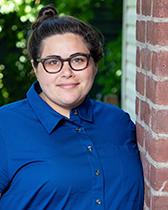
Shira E. Schwartz
Assistant Professor, Department of Religious Studies
Project: Hormonal Ethnography: Hysterical Hormones, Hormonal Havrutas
"This project outlines a new methodology for the hormonal ethnographic study of religious lives. Religion often treats bodies seeking transformation, molding them toward specific kinds of 'life' through activities, environments, and relationships that act on bodies like a drug. Facilitating highs and lows, desire and repulsion, excitement, and anxiety, these interactions generate religious effects in the hormonal body: a crossing of psychological, affective, and erotic processes that facilitate bodily change. While religion is often studied through its texts, following hormones highlights the reciprocal impact of texts and bodies. Combining the mixed methods of lived religion and bioethnography, I follow hormonal religious bodies to link realms of religious life and embodiment often separated by discipline. This approach provides a wider ecology of hormonal bodies, and fosters new connections across humanistic, social scientific, and biomedical data collection in the study of religious lives."
Daniel Shanahan
Associate Professor of Music Theory and Cognition, Bienen School of Music
Project: A History of the Algorithmic Individuation of Music
"My book project attempts to provide a prehistory of the algorithmic individuation of music listening by exploring how researchers in the past attempted to encode and analyze the musical experience. Specifically, I explore how the choices made in the early era of digital computing enabled the squishing of a multi-dimensional musical object into a single-line stream to be processed by a mainframe computer, and how these choices have continued to shape how we ask computers to process music to this day."
Frank Sweis
User Experience Librarian, Assessment and Planning, Northwestern University Libraries
Library Affiliate 2025-2026
Frank Sweis is part of the Assessment and Planning team at Northwestern University Libraries. As the UX Librarian, he evaluates and helps design library systems and digital services for students and faculty. He has a B.A. in History and M.S. in Human-Computer Interaction from DePaul University. His research interests include interaction design and digital accessibility.


